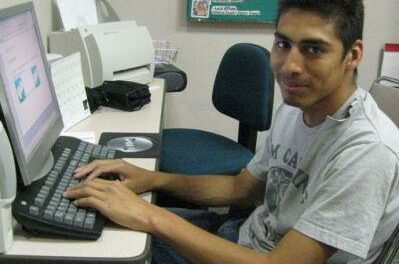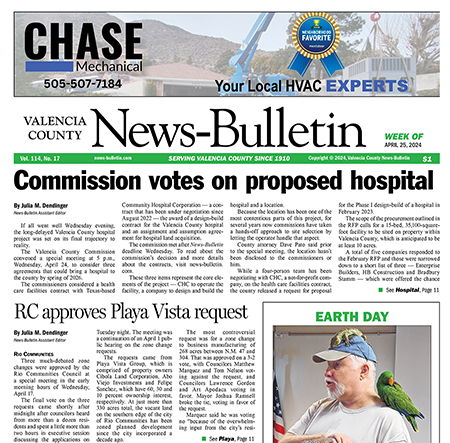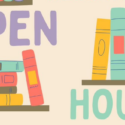
(Editor’s note: This is the first of an ongoing series the Valencia County News-Bulletin will be publishing about literacy — topics to include reading and resources, finances, media, health, social and civic literacy.)

Valencia County Literacy Council Executive Director Dores Jay-Pang, left, and VCLC board president Kathleen Pickering, right, enjoy some time in the stacks at the Belen Public Library. Public libraries and community centers across Valencia County are frequent meeting places for volunteer literacy council tutors and their students.
Some dreams are big — be the next great inventor, make a billion dollars, cure cancer.
Some dreams are smaller, but just as critical — fill out a job application, ask questions at a parent/teacher conference, read food labels at the grocery store.
Since 1984, the Valencia County Literacy Council and its cadre of volunteer tutors and program directors have been helping Valencia County residents improve their literacy skills and achieve their small dreams, which could very well launch them on the way to the big ones.
According to information on the ProLiteracy website, the national body of VCLC, more than 43 million adults across the country cannot read, write or do basic math above a third-grade level.
For nearly four decades, VCLC’s mission has been to enable adults to achieve personal goals and very young children to achieve pre-literacy skills through literacy services provided to families free of charge.
The core of the council’s services — one-on-one and small group tutoring — has been fairly limited in the last two years due to COVID-19, but board president Kathleen Pickering and Dores Jay-Pang, the VCLC executive director, say the program is reestablishing its services and returning to a more visible presence in the community.
The vision of the council is a Valencia County in which all residents have the literacy skills they need to achieve their own dreams.
“It’s been shown that anyone can take a course but the people who retain the information are doing it in a context of something they need to accomplish, like getting a mortgage or applying for benefits,” Pickering said. “We found people that were learning English, they want to know what the employment contract really means, what benefits will they receive.”
A firm grasp of English and good literacy skills, people are able to ask questions about everything from a medical appointment to a human resources issue, Jay-Pang said.
To help people improve their literacy, a connection has to be made, and that’s where Cecy Rodriguez comes into the picture.
The volunteer coordinator for the VCLC since 2015, Rodriguez’ primary responsibilities are outreach and recruitment of students and tutors for the program.
Rodriguez oversees intake testing of students to determine their literacy level, as well as regular monitoring to make sure students are progressing. She also recruits volunteer tutors and helps match them with students.
Prior to COVID, pushing services to online and hybrid meetings, VCLC served an average of 140 students a year, she said.
Anyone wanting to be a volunteer tutor for VCLC is trained before they begin working with clients, Rodriguez said.
“The training is the most important thing,” she said. “We have teachers who want to be tutors but they still have to go through the training.
Tutors must be at least 18 years old and demonstrate the ability to speak, write and understand English well enough to communicate clear. Volunteers must have at least a high school diploma or GED to be eligible to be a tutor.
Tutors also have to agree to a 12-month commitment to their student or students.
“Once the tutors are ready, we match them with a student, or if they want, a small group,” Rodriguez said. “It’s my job to provide a place (for them to meet).”
One-on-one tutoring sessions are twice a week for one hour and small groups meet twice a week for 2 1/2 hours, for a total of five hours. Students test after every 60 hours of tutoring to make sure their skills are improving.
The VCLC also offers a bilingual escuelita — a little school — twice a week at the El Cerro Mission Community Center. The small group is mostly women wanting to improve their English skills and their children.
“I live in Meadow Lake and know the needs. I had to go to school to learn English and with three kids. That was hard. I had to wait until my youngest was 15,” Rodriguez said. “A lot of people don’t have a place to leave their kids or money for day care. With the escuelita, they don’t have to wait. They can bring their kids with them and learn together.”
Helping people increase their literacy and English skills gives them confidence and freedom to go to the store by themselves or to a doctor’s appointment without having their children serve as translators, Rodriguez said.
“It helps them have a better job, to have success,” she said. “Literacy is also important in that it helps the economy of the community. When employers get workers trained in literacy, their business profitability improves.”
Research has shown for every $1 spent on literacy, $33 is returned to the local economy, Rodriguez said, and the Barbara Bush Foundation for Family Literacy found that moving all adults to the equivalent of a sixth-grade reading level would create an extra $2.2 trillion annual income for the U.S.
Literacy Council Services
- Free volunteer tutoring for adults
- Family literacy services
- BOOK Readers and free children’s books at local, low-income medical clinics
*Some services and programs may be offered in a virtual or hybrid model due to COVID-19 safety measures.
Valencia County Literacy Council’s office is located at The University of New Mexico-Valencia campus, 280 La Entrada, Tomé.
VCLC tutoring program offers small group and one-on-one tutoring sessions for teens 16 and older, as well as adults who have low reading skills, want to learn English as a second language, or are preparing for the U.S. citizenship test.
For more information about receiving tutoring or to be a tutor, call VCLC’s volunteer coordinator Cecy Rodriguez at 505-925-8926.
To learn more about the council’s board, goals and mission, visit valencialiteracy.org.
Peggy McLoughin, a kindergarten through 12th grade bilingual teacher who retired after more than 20 years, was a tutor for VCLC for a year before the pandemic began.
“I think the literacy council does wonderful things for the community,” McLoughin said.
As a tutor, she said one of the highlights was when a student’s pronunciation improved.
“No matter how bright or how high a vocabulary someone has, they will be perceived as ignorant based on be able to say a word right,” she said. “As a tutor, you are giving your students a lot of feedback and support, letting them know they are supported but you aren’t going to do it for them.
“You also have to understand their goals, where they’re coming from, which will help you find ways to get them to read at home, to do it on their own.”
Adults 16+ Lacking Basic Prose Literacy Skills*
Valencia County 19.9%
N.M. 16.5%
U.S. 14.5%
*The literacy of adults who lack BPLS ranges from being unable to read and understand any written information in English to being able to locate easily identifiable information in short, commonplace prose text, but nothing more advanced.
(Source: 2003 National Adult Literacy Survey)
Valencia County Literacy Council’s
Mission Statement
VCLC’s mission is to enable adults to achieve personal goals and very young children to achieve pre-literacy skills through literacy services provided to families free of charge.
Vision
We envision a Valencia County in which all residents have the literacy skills they need to achieve their own dreams.
The literacy council is partially funded through the New Mexico Higher Education Department, but the rest is hustling for grants and donations.
“Part of the executive director’s big burden is fundraising,” Pickering said.
VCLC has received grants from corporations such as Facebook and the American Dream Literacy Initiative, a project of the American Library Association and the Dollar General Literacy Association.
In-kind support comes from the volunteer tutors, who account for about $22,000 in income.
With so many things moving very quickly thanks to technology, McLoughin said “with literacy you have to slow things down, really savor a novel and get away.”
Being able to read and write are the hallmarks of literacy, but Jay-Pang says there’s much more to it.
“It’s knowing and understanding, because you can know but not understand,” she said. “It’s more than knowing the ABCs of everything. You can know the language but you don’t understand.
“You can manage your checkbook but you don’t understand how to invest, how to manage money in the big financial system. Literacy is everything — digital literacy, financial literacy, civic literacy.”
Embracing the concept of life-long learning will enable people to grow and feel more confident with broader skill sets, said Pickering.
“It helps people to have a better life,” she said. “Our goal is to instill that love of constantly expanding your literacy and finding new literacies that you can improve on. Things change in the blink of a minute.”
Jay-Pang pointed out there is something to learn at every phase of a person’s life, from learning about the workforce to learning about entering retirement.
“People need to learn these transitions happen throughout your life, so adopting a posture of wanting to learn your whole life I think protects you from getting left behind at whatever stage you’re in,” she said.
That need for constant learning is why VCLC works to make sure students are getting the literacy they need by folding in basic financial literacy and technology literacy.
“There’s so much available. You can learn on your own but to even navigate a basic web page you need literacy,” Pickering said.
Another need the literacy council meets is helping people improve their English skills. With 31 percent of the households in Valencia County speaking a language other than English, and some census tracts as high as 40 to 47 percent, Jay-Pang says English as a second language programming is a big focus for the council.
Whatever a person’s need, the literacy council is there to support them and help them move forward, Jay-Pang said.
“I think literacy is the salsa of your life. Literacy is what will either make you step up or down,” she said.
Julia M. Dendinger began working at the VCNB in 2006. She covers Valencia County government, Belen Consolidated Schools and the village of Bosque Farms. She is a member of the Society of Professional Journalists Rio Grande chapter’s board of directors.

















